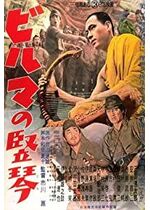-
Hiram 2022-04-19 09:02:44
wrong tonality
While the film was being shown, my husband who got off work pushed open the door and took off his shoes, and suddenly exclaimed, "Yo! What film, this music is like...a memorial service." This sentence hit me. The soundtrack is indeed mournful. Then cover the whole piece like wallpaper. When the...
-
Axel 2022-04-19 09:02:44
He only saves the dead of the Japanese army
"In the castle in spring, a flower viewing party is held. Dendrobium and dendrobium are intertwined, and the shadows are on the wall. The moonlight passes through the branches of the ancient pine, and time flies . " The clothes are still in good condition, and the head is already a skeleton....i
-
Alvah 2022-01-20 08:03:36
Too literary and beautiful "Myanmar Harp"
All participants in the war have died, regardless of whether they can survive or not. This film is really too literary and beautiful. The pain of war it shows only stays on the surface, not deep into the heart. The real pain is not something you can think about, or it can be avoided like Mizushima....
-
Kiley 2022-01-20 08:03:36
Comment on "The Burmese Harp"
Burmese harp Zhao Song Towards the end of World War II, the Allied counterattack in Southeast Asia caused the Japanese army to collapse across the board, and a small group of Japanese soldiers retreated into Burma. The entire process of defeat and escape was carried out in an orderly state. There...
-
Amani 2022-01-20 08:03:36
Love without borders
"The Harp of Burma", a black-and-white film that was post-war Japan in 1956, may not be particularly familiar to everyone. However, there is one piece in this movie that everyone must be familiar with, and that is "Farewell" written by Mr. Li Shutong. When mentioning this song, many people would...
-
Eryn 2022-01-20 08:03:36
Like a drama that transcends nationality and race
During the Second World War, Japan advocated that the fist is civilization, including the "Summary of Civilization Theory" and "The Theory of Leaving Asia". Yukichi Fukuzawa, who had a huge influence on Japan, also advocated the same. Therefore, under the influence of militarism, Japan launched...
-
Casper 2022-01-20 08:03:36
The Japanese version of "Farewell" is called "Lover Sorrow"
The self-salvation of the Japanese soldiers is gentle and elegant, with a strong literary atmosphere. The film is very beautiful and worth watching, but I can’t give it to 5※, because in that war, we all know what the Japanese did, and it’s not your self-salvation that can solve it. At the...
-
Sanford 2022-01-20 08:03:36
Harp of Burma
Pure commemorative stickers
I watched a very old black-and-white movie in a small theater in Bo Village in '18. It cost only five dollars, and almost all people watched were elderly people. Although there is no color, it can make people feel the emotion that the author wants to express and the...
-
Wayne 2022-01-20 08:03:36
It’s not a militaristic movie. I reflected on what is true patriotism.
"The Harp of Burma" 1956, directed by Ichikawa Kun, adapted from Oshiyama Michio's works, and was selected for 200 famous Japanese novels. Take Mizushima as the main line and the captain as the secondary line. Mizushima, a scout and musician, lost his teammates during the mission. On the way back...
-
Benedict 2022-01-20 08:03:36
When will there be "Chinese Guqin"
"The Harp of Burma" Japanese film master Chuan Kun is a black and white film, and the film is as simple as black and white: Mizushima is the scout who explores the road, and the harp is his signal after he explores the road. On the eve of the Japanese armistice, he was ordered to notify the...
- Comedy Movie Reviews
- Action Movie Reviews
- Romance Movie Reviews
- Thriller Movie Reviews
- Crime Movie Reviews
- Animation Movie Reviews
- Horror Movie Reviews
- Adventure Movie Reviews
- Fantasy Movie Reviews
- History Movie Reviews
- Documentary Movie Reviews
- Western Movie Reviews
- Drama Movie Reviews
- War Movie Reviews
- Musical Movie Reviews
- Family Movie Reviews
See More
Less
The Burmese Harp Reviews
Director: Kon Ichikawa
Language: Japanese,English,Burmese Release date: April 28, 1967

